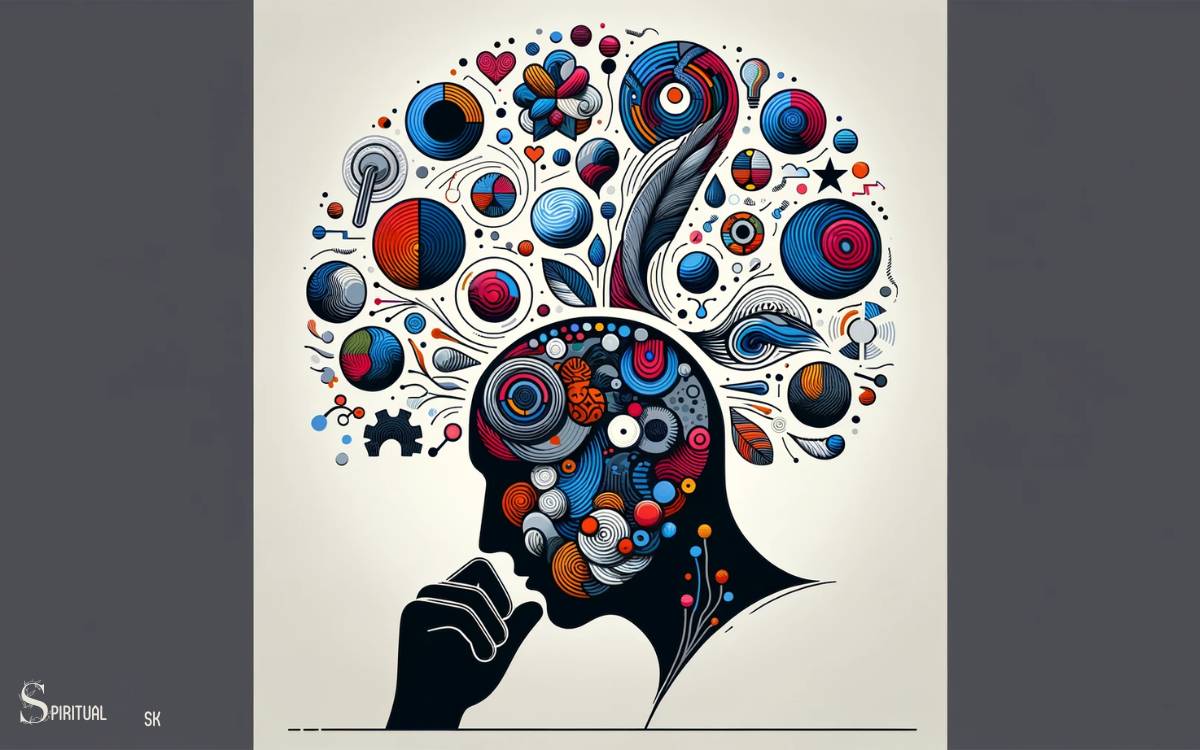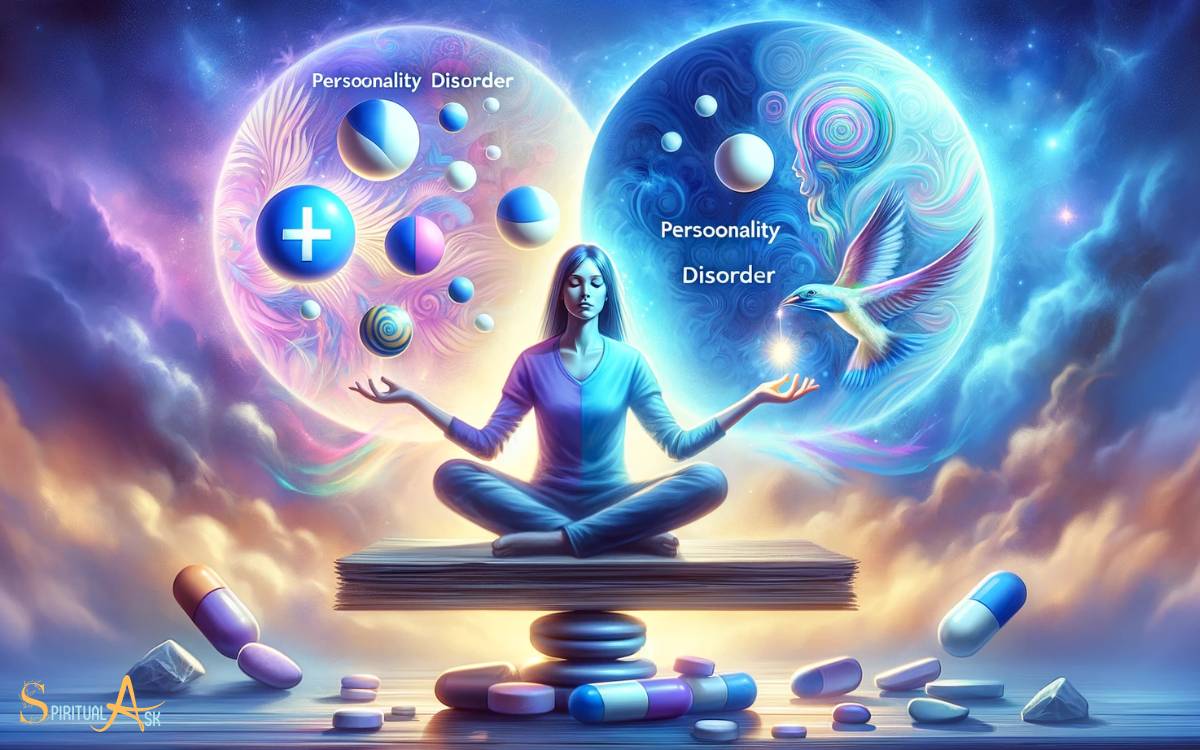Bpd And Spiritual Awakening: Two Different Concepts!
Borderline Personality Disorder (BPD) and spiritual awakening are two different concepts that might intertwine in some individuals’ lives.
BPD is a mental health condition characterized by unstable moods, behaviors, and relationships,
Whereas a spiritual awakening is a process of transcendent, internal change that significantly alters one’s perception of life and existence.
BPD is a long-term pattern of abnormal behaviour characterized by unstable relationships with other people, unstable sense of self and unstable emotions.
On the other hand, a spiritual awakening is a realization or opening to a higher level of consciousness or a more profound understanding of the universe, often catalyzed by life crises, mindfulness practices, or introspective reflection.
In some cases, individuals with BPD might experience a spiritual awakening as part of their healing journey. This transcendental shift can help them gain a deeper understanding of their condition and develop healthier ways to cope with their emotional turbulence.
However, a spiritual awakening does not replace professional mental health treatment but can act as a valuable supplement to therapy and medication.

Key Takeaway
5 Features of Spiritual Awakening for People with Bpd
| Feature | BPD | Spiritual Awakening |
|---|---|---|
| Definition | A mental health disorder that impacts the way one thinks and feels about oneself and others, causing problems functioning in everyday life. | A profound shift in consciousness where one becomes aware of the deeper, more spiritual aspects of life. |
| Symptoms/Signs | Intense emotional swings, impulsivity, feelings of emptiness, unstable relationships. | Increased self-awareness, desire for authenticity, compassion for all life, experiencing synchronicities. |
| Treatment/Coping Mechanisms | Therapy (like DBT or CBT), medications, and support groups. | Meditation, self-reflection, spending time in nature, seeking guidance from spiritual mentors. |
| Associated Challenges | Emotional instability can cause problems in relationships, work or school, and social activities. | Discomfort in transcending old patterns, isolation due to shifts in perception and values. |
| Potential Benefits | With proper treatment, individuals can lead fulfilling lives. Increased self-awareness can provide opportunities for personal growth. | Deepened sense of peace, purpose, and connection. Enhanced compassion, empathy, and understanding of others. |
Five Facts About: Spiritual Awakening for People with Bpd
Understanding Bpd And Its Symptoms
Borderline personality disorder, or bpd, is a mental health condition that affects a person’s emotions, thoughts, and behavior.
This disorder affects how an individual views themselves, their relationships, and the world around them. Bpd affects approximately 1. 6% of the us adult population, with higher prevalence in women than men.

What Is Borderline Personality Disorder?
Bpd is a serious mental illness that can cause extreme emotional instability, impulsiveness, and difficult relationships with others.
The exact cause of bpd is still unknown, but it seems to be a combination of genetic and environmental factors. Bpd symptoms can vary widely, from mild to severe, and can change over time.
The Different Types Of Bpd
There are four subtypes of borderline personality disorder, which are based on the predominant symptoms an individual presents:
- Impulsive type: This type of bpd is characterized by impulsive behavior such as substance abuse, gambling, reckless driving, and binge eating.
- Petulant type: People with this type of bpd are easily angered and offended, and often have difficulty regulating their emotions.
- Discouraged type: This type of bpd is characterized by feelings of hopelessness, worthlessness, and guilt.
- Self-destructive type: People with this type of bpd engage in self-harming behaviors, such as cutting or burning themselves, and often feel the need to punish themselves.
Common Symptoms And Characteristics Of Bpd

Bpd is defined by a pervasive pattern of instability in relationships, self-image, emotions, and behavior.
The following are common symptoms of bpd:
- Intense fear of abandonment, and frantic efforts to avoid real or imagined abandonment.
- Unstable and intense relationships, characterized by idealization and devaluation of people in their lives.
- Identity disturbance, including unstable self-image or sense of self.
- Impulsivity in at least two areas that are potentially self-damaging, such as substance use, reckless driving, binge eating, etc.
- Recurrent suicidal ideation, suicidal behavior, or self-mutilating behavior.
- Intense and unstable emotions, such as extreme anger, anxiety, depression, irritability, and shame.
- Feelings of emptiness or boredom.
- Paranoid ideation or dissociation in response to stress.
How Bpd Affects Daily Life
Bpd affects many aspects of a person’s life, including work, education, relationships, and overall quality of life. People with bpd may struggle with daily activities such as maintaining employment, managing finances, and handling interpersonal relationships.
This disorder can lead to a range of negative outcomes, such as substance abuse, eating disorders, and self-harm.
It’s important to seek professional help if you’re experiencing any symptoms of bpd.
Spiritual Awakening And Its Significance

Explaining The Concept Of Spiritual Awakening
Spiritual awakening is a broad concept that means different things to different people. However, in general, it refers to a fundamental shift in one’s perspective and understanding of life.
It is a process of self-discovery that brings a profound and lasting change in one’s awareness.
How To Identify A Spiritual Awakening
Here are a few signs that indicate you may be going through a spiritual awakening:
- A deep sense of peace and contentment
- Letting go of old patterns and habits
- A heightened sense of intuition and inner guidance
- Feelings of love, compassion, and empathy for others
- A strong desire to connect with nature, spirituality, or a higher power
- A sense of detachment from material possessions and societal norms
Key Characteristics Of A Spiritual Awakening
Spiritual awakening is characterized by a shift in consciousness.

Here are some of the key features:
- A deep understanding and acceptance of the interconnectedness of all things
- A sense of being present in the moment, without judgment or expectation
- A feeling of expanded consciousness, beyond the limits of the physical body
- A sense of connection with a higher power or universal consciousness
- A release of fear, guilt, and other negative emotions
- A recognition of the impermanence of physical reality and the eternal nature of the soul
Ways In Which Spiritual Awakening Can Enhance One’S Life
Spiritual awakening can have a profound impact on one’s life, leading to a greater sense of purpose, fulfillment, and wellbeing. It often fosters a heightened awareness of the interconnectedness of all living beings, allowing individuals to develop deeper and more meaningful relationships. Through empathic experiences and spiritual growth, one can cultivate compassion and understanding, transforming not only their perspective but also the way they interact with the world around them. This journey can lead to a more authentic existence, grounded in love, empathy, and a sense of belonging.
Here are some of the ways it can enhance your life:
- Greater self-awareness and self-confidence
- Improved relationships with others
- Greater resilience and ability to cope with stress and challenges
- Increased creativity and sense of purpose
- Improved physical, mental, and emotional health
- A deep sense of inner peace and joy
Overall, spiritual awakening is a transformative process that can change your life for the better. By cultivating awareness, openness, and a willingness to embrace change, you can embark on a journey towards greater meaning, purpose, and fulfillment. It is important to remember that this journey is deeply personal and can unfold in unique ways for each individual. While the process can lead to profound shifts in perspective and a deeper connection with yourself and the world around you, some may wonder, is spiritual awakening permanent? The truth is, the experience can ebb and flow, with periods of clarity and growth interwoven with moments of challenge and integration, all of which contribute to your ongoing evolution.
The Relationship Between Bpd And Spiritual Awakening

Examining How Bpd Can Be A Catalyst For Spiritual Awakening
Borderline personality disorder (bpd) patients are deeply sensitive, intense, and often experience difficulties regulating emotions. However, these struggles can also lead to the development of remarkable spiritual awareness and transformation.
Here’s how:
- Bpd patients often experience deep introspection, given the intense emotional turmoil they frequently face. As a result, they are more likely to question the meaning of life, which can lead to profound spiritual changes.
- These introspective tendencies often lead to a sense of detachment, which can allow for deeper spiritual awakening, mindfulness, and the capacity for love and compassion.
- The intensity of bpd symptoms often leads patients to explore spiritual options as a means of healing and seeking relief from their struggles.
The Benefits Of Spiritual Awakening For Individuals With Bpd

Bpd can be an incredibly difficult road for those who experience it, with extreme emotions and a high risk of toxic behaviours such as substance abuse or suicidal ideation.
However, spiritual awakening can offer an array of benefits for individuals struggling with bpd:
- An increased sense of purpose and direction can help bpd patients find meaning and hope amidst the turbulence of their emotional lives.
- Spiritual practices, like meditation and mindfulness, can prove beneficial for better regulating intense emotions, the hallmark of bpd.
- Enhancing spirituality can aid in forgiveness, replenish self-esteem, and offer a new sense of security and connection to the world.
How Spiritual Awakening Can Help Manage Symptoms Of Bpd

For individuals with bpd, spiritual practices can provide significant relief and benefit.
Here’s how:
- Studies show that embracing mindfulness and meditation can decrease impulsivity and emotional reactivity in bpd patients.
- Developing and living by spiritual values, like empathy, compassion, and forgiveness, can reduce and prevent interpersonal conflicts that often arise from bpd symptoms.
- Enhancing spirituality may improve the mood of bpd patients and reduce feelings of isolation and hopelessness.
Overall, while the relationship between bpd and spiritual awakening is complex, it’s possible to find, through mindfulness and accepting spirituality – a route to spiritual understanding and personal transformation.
Strategies For Combining Bpd With Spiritual Awakening
Borderline personality disorder (bpd) can be a challenging condition to live with, but the journey towards healing can be made easier by combining it with spiritual awakening.

Here are some effective strategies that can help individuals with bpd to re-connect with their spirituality:
Practicing Mindfulness And Self-Awareness
Mindfulness is the practice of being fully present in the moment, accepting your thoughts and feelings without judgment.
It helps individuals with bpd to identify and regulate their emotions, and to live in the present moment rather than dwelling on past or future fears and anxieties.
Some effective mindfulness practices include:
- Deep breathing exercises
- Sensory awareness exercises
- Body scan meditation
Incorporating Meditation And Yoga

Meditation is the practice of quietening the mind and focusing on stillness, while yoga is a physical practice that can help individuals with bpd to connect with their body and breath.
Both practices can contribute to heightened awareness, emotional balance and overall wellbeing.
Some types of meditation and yoga that can be especially helpful for bpd include:
- Loving-kindness meditation
- Restorative or gentle yoga
- Kundalini yoga
Building Strong Relationships With Spiritual Mentors
Having a strong support system is essential for individuals with bpd. Spiritual mentors can be valuable guides and sources of wisdom during the journey towards spiritual awakening.
When choosing a spiritual mentor, look for someone who:
- Has a deep understanding of bpd and spiritual practices
- Is compassionate, empathetic and non-judgmental
- Guides you towards discovering your unique inner wisdom
Other Therapeutic Options That Can Help Individuals With Bpd And Spiritual Awakening
In addition to mindfulness, meditation, yoga and spiritual mentorship, there are several other therapeutic options that can help individuals with bpd to find peace, balance and harmony.
Some of these include:
- Cognitive-behavioral therapy (cbt)
- Dialectical behavior therapy (dbt)
- Eye movement desensitization and reprocessing (emdr)
- Holistic healing practices such as acupuncture, aromatherapy, and massage therapy
Remember, the journey towards bpd and spiritual awakening is unique for everyone. By incorporating these strategies into your daily routine, you can find the path that works best for you.
How Does Spiritual Awakening Relate to BPD?
Spiritual awakening and Borderline Personality Disorder (BPD) are distinct experiences, yet they can intersect in complex ways.
Here’s how they relate:
- Emotional Intensity: Both involve intense emotions, but spiritual awakening can offer insights and coping mechanisms that might help manage BPD’s emotional volatility.
- Self-Identity: While BPD can involve struggles with self-identity, spiritual awakening often promotes a deeper understanding and acceptance of oneself.
- Perception of Reality: Spiritual awakening might alter one’s perception of reality, potentially complicating or enriching the experience of someone with BPD.
Faith, Fasting, And Spiritual Freedom these spiritual practices can offer new perspectives and coping strategies for individuals with BPD, potentially providing a sense of liberation and deeper self-understanding.
It’s crucial to approach this intersection with sensitivity, recognizing that spiritual experiences can be profoundly personal and vary widely among individuals, particularly those with BPD.
FAQ About Bpd And Spiritual Awakening
What Is Bpd?
Borderline personality disorder (bpd) is a mental illness characterized by difficulty regulating emotions, unstable relationships, and impulsive behavior.
What Is Spiritual Awakening?
A spiritual awakening is a process of realization and transformation of an individual’s consciousness and understanding of themselves and the world around them.
Can Bpd Trigger A Spiritual Awakening?
Bpd can be a catalyst for a spiritual awakening as individuals with bpd often experience intense emotional and psychological pain, which can lead them on a journey of self-discovery and spiritual growth.
How Can Spirituality Help Those With Bpd?
Practicing spirituality can help those with bpd find inner peace, a sense of purpose, and a deeper understanding of themselves, leading to healthier relationships and emotional stability.
Conclusion
People who suffer from borderline personality disorder (bpd) are often characterized as emotional and unstable. However, they also possess a unique perspective on the world and can often be drawn towards spiritual concepts.
Bpd individuals can struggle with finding balance and developing healthy coping mechanisms, which can greatly affect their spiritual awakenings.
By embracing self-awareness, mindfulness, and self-compassion, those with bpd can unlock the benefits of spiritual practices, including a deeper connection with a higher power, increased emotional regulation, and a sense of purpose.
Through the integration of spiritual practices and therapy, bpd individuals can learn to navigate their emotions with greater ease, forge meaningful connections, and discover their true selves.
While bpd may present some obstacles to the path of spiritual awakening, it is certainly not a hindrance, and with the right approach, those with bpd can develop their spiritual potential and lead fulfilling, meaningful lives.





